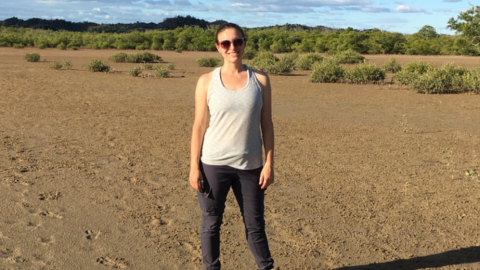This episode goes inside the body, Magic School Bus-style. It investigates how the trillions of microorganisms that live inside our gut influence our physical and mental health and why staying silent about pooping, farting and gut stuff prevents us from having a healthier brain-gut connection.
Is this new gut fad worth it?
Probiotic supplements, healthy gut teas, and so on are branded as the key to building and maintaining a healthy gut. But nutritionist Ian Carroll says start by going back to the basics: what you eat influences how your microbes behave and the type of microbes that are there. Eating a diet that is diverse in macro and micronutrients will foster a rich and diverse microbiome, which supports greater immune and digestive health.
Scientist Lydia Greene says that when she eats, she thinks about feeding her garden. In a healthy gut microbiome, bacteria extract nutrients from our food. The ability for “bad bacteria” to colonize depends on the abundance of “good bacteria.” Have you tried products to help with your gut health? What were they? Do/did they have any effect? How would thinking about eating as “feeding your garden” change your relationship with food or your body?
Is 'gut feeling' a real thing?
There is a strong communication network between the gut and the brain. Lin Chang describes it as a two-way highway system: nerves, bacteria and hormones pass information back and forth which can affect our mood, digestion, stress response and more. How does thinking about the gut-brain connection change your understanding of stress? On days when you’re stressed or have a big presentation, do you notice changes in your poop?
What's up with my poop?
Unlike chest pain or a headache, gut and poop issues are a lot more difficult for folks to talk about. This can have big consequences, according to Anita’s dad, gastroenterologist Dr. Satish Rao. But ignoring troubles with pooping, farting, bloating or any gut stuff, just leads to more pain. We all fart. We all poop. And paying attention to our poop can actually be super informative. Anita’s dad is a big proponent of getting to know the Bristol Stool Scale to help you diagnose what’s going on with your gut. What kind of pooper are you?
-
Ian Carroll is an assistant professor of nutrition at the University of North Carolina at Chapel Hill.
-
Lin Chang is a gastroenterologist and co-director of the G. Oppenheimer Center for Neurobiology of Stress and Resilience at UCLA.
-
Want to dig in further?
- Get To Know Your Microbiome >>
- How The Food You Eat Affects Your Gut >>
- How The Gut Affects Your Mood >>
Return To The Embodied Podcast Discussion Guide >>











